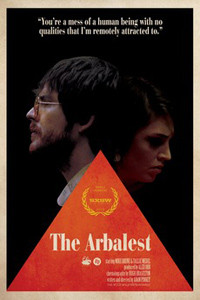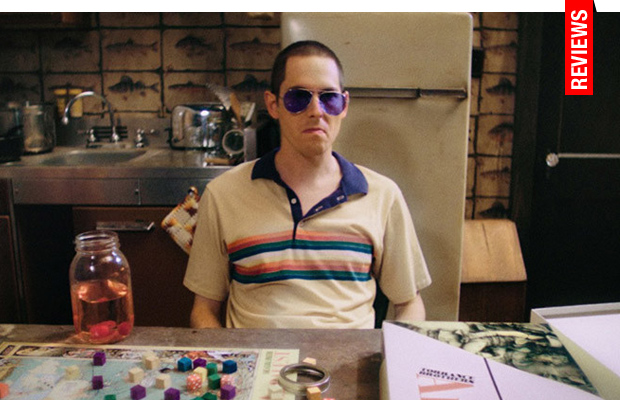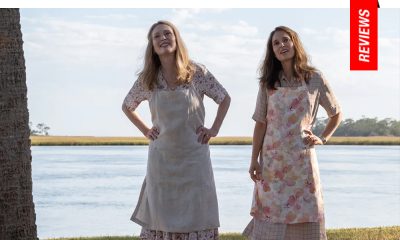Reviews
The Arbalest | 2016 SXSW Film Festival Review
Toy Story: Pinney’s Debut a Strange Love Puzzle
 Writer and cinematographer Adam Pinney (credited for both on indie filmmaker Adam Orr’s films Blood Car and A is for Alex, as well as lensing Joe Swanberg’s 24 Exposures) strikes out with his own directorial debut, the peculiar The Arbalest. The 1970s set tale of a famed toy inventor’s unrequited obsession with a woman ends strangely, but continues to haunt him throughout the years, inspiring a later, more dangerous invention. Although the film’s puzzling narrative and decidedly offbeat tone are enterprising sometimes intrigues, it just as often fails to directly engage, with moments of zaniness jolting it out of its bizarro world stupor too frequently and unnecessarily.
Writer and cinematographer Adam Pinney (credited for both on indie filmmaker Adam Orr’s films Blood Car and A is for Alex, as well as lensing Joe Swanberg’s 24 Exposures) strikes out with his own directorial debut, the peculiar The Arbalest. The 1970s set tale of a famed toy inventor’s unrequited obsession with a woman ends strangely, but continues to haunt him throughout the years, inspiring a later, more dangerous invention. Although the film’s puzzling narrative and decidedly offbeat tone are enterprising sometimes intrigues, it just as often fails to directly engage, with moments of zaniness jolting it out of its bizarro world stupor too frequently and unnecessarily.
In 1968 New York City, hopeful toy inventor Foster Kalt (Mike Brune) meets Sylvia Frank (Tallie Medel) in a hotel room, along with another random stranger, Paul (Matthew Stanton). All are attending a toy convention, but Foster’s invention, a filter which converts oxygen to helium, isn’t quite the right fit for the event. A drug and alcohol fueled night leads to tragedy for Paul but also clinches Kalt’s fascination with the beautiful woman. Together, they take credit for Paul’s toy, a ‘puzzle’ cube (yes, the Rubik’s Cube), and Foster becomes the famous inventor of the Kalt Cube. A decade later, in 1978, he exists alone in a cabin in the woods with his own mounting madness, agreeing to give an exclusive interview, where he details his plans, involving a new invention, Sylvia (now a photographer) and her husband, John (Robert Walker Branchaud).
Who is Foster Kalt? That’s the question Pinney doesn’t quite provide the answer to, a famed toy inventor whose experiences in a fateful hotel room meeting will dictate not just his trajectory, but the entire film. Jumping ahead in time, through interview clips with the reclusive artist while he’s pursued by gaggle of journalists eager to snag proof of the rampant rumors circulating him, perhaps the most reasonable passage of dialogue finds Kalt explaining to us, “Life isn’t about toys, it’s about mistakes.” And so we get to the kernel of another story about amour fou, though with a particularly strange window dressing.
Much of The Arbalest feels like early Alex Ross Perry, hyper intelligent but its most promising entertaining attributes lost in its own density. Its light sprinkles of period integrity (mostly revealed in the strangulating set design of the early hotel room sequence) often feel cheap, and sometimes desperate, though its red herring (or, in this instance, red balloon) subject matter may also put one in mind of Andrew Bujalski’s Computer Chess (as far as vintage artifacts) if it were calibrated as a daytime soap opera.
And what is an arbalest? It isn’t either of Foster’s toys, but actually an enhanced medieval crossbow. As a sort of bizarre allusion to Kalt’s eventual final ‘toy’ the title enhances the film’s enigma, but is also obscure to the degree of hobbling interest. By the time we get to its last thirty minutes or so, Pinney’s film hits its more inspired strides, thanks in part to a tone which feels increasingly surreal and delirious.
Reviewed on March 14th at the 2016 SXSW Film Festival – Narrative Competition. 76 Mins.
★★★½/☆☆☆☆☆
Los Angeles based Nicholas Bell is IONCINEMA.com's Chief Film Critic and covers film festivals such as Sundance, Berlin, Cannes and TIFF. He is part of the critic groups on Rotten Tomatoes, The Los Angeles Film Critics Association (LAFCA), the Online Film Critics Society (OFCS) and GALECA. His top 3 for 2021: France (Bruno Dumont), Passing (Rebecca Hall) and Nightmare Alley (Guillermo Del Toro). He was a jury member at the 2019 Cleveland International Film Festival.

































